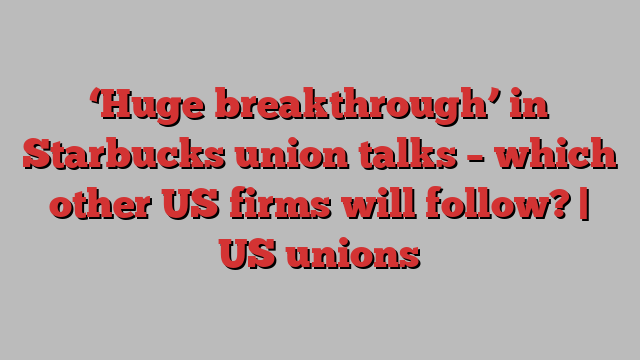
For more than two years Starbucks has fought fiercely against unionization. Now the company appears willing to come to the bargaining table.
Starbucks and its union made a surprise joint announcement in late February: they had agreed to seek “a constructive path forward” on “the future of organizing and collective bargaining”.
On Tuesday, the Starbucks union said it would resume in-person bargaining with the company in late April, with the aim of achieving a “foundational framework agreement”. It said there would be “bargaining delegates representing more than 400” unionized Starbucks stores.
The news – while cautiously received – is not just much-needed cheer for workers at the coffee chain, but for others at Amazon, Trader Joe’s and the outdoor sports retailer REI, whose own efforts to reach a first contract have barely inched forward in the last 18 months.
If Starbucks – the company that labor experts say has been the most aggressive union-buster in decades – has signaled that it might finally be ready to reach a union, who would be next?
“It’s a huge breakthrough,” said Claire Chang, a sales associate at the REI store in Soho in Manhattan, which, in March 2022, became the first REI store in the US to unionize. “After two years of trying to win a contract, the Starbucks workers finally got this huge multibillion corporation to meet them at the bargaining table, after the company was so adamant, it gives us some hope.”
Chang and many other REI workers have criticized their company for the glacial pace of contract talks. The Starbucks developments, Chang said, “reignited the flame for us that we just have to keep going”.
John Logan, a professor of labor studies at San Francisco State University, said he remained skeptical about the Starbucks announcement and whether the coffee chain will stop its union-busting activities and reach a first contract any time soon. The National Labor Relations Board (NLRB) has filed 128 complaints against Starbucks, accusing it of more than 1,000 violations of the law, among them, firing dozens of baristas in retaliation for supporting the union. Starbucks denies any wrongdoing.
Logan said that if Starbucks reaches a good contract with its union, Starbucks Workers United, “that could turn out to be one of the greatest union success stories of the last several decades. It’s almost akin to Amazon or Tesla deciding they’re not going to union-bust any more.
“If Starbucks does reach an agreement,” Logan added, “it would act as an inspiration for other workers.
Michelle Eisen, a barista and spokesperson for the Starbucks union, voiced optimism about the Starbucks-union announcement. “We’re excited to forge a new path forward with Starbucks based on mutual respect,” she said in an email. “We hope our shared commitment to work collaboratively inspires other companies to recognize that respecting worker voice is good for business.”
Starbucks made its peace offering to its union after its union-busting and the many NLRB charges against it hurt its reputation, after its stock price took a beating, after the union disrupted dozens of stores with a wave of strikes, and after many people began calling for a nationwide boycott. Starbucks officials have indicated they are ready to turn the page with the union.
“It’s incredibly significant that Starbucks has finally agreed to a framework for working with the union,” said Richard Bensinger, who was an adviser to the Starbucks union when it won its first unionization elections in late 2021 and early 2022 despite the company’s aggressive anti-union efforts. “This will send a message to other workers that organizing can succeed.”
Seth Goldstein is a lawyer for the Amazon Labor Union, which made history by winning the first union election at an Amazon warehouse in the United States – the union won 2,654 votes to 2,131 in April 2022 at Amazon’s JFK8 warehouse on Staten Island. Goldstein said “it would be wonderful” if Starbucks stops fighting its union and agrees to a first contract.
“It would have a positive effect for Amazon workers because they would see that unionization works,” he said. “But I don’t know if it will change Amazon’s union-busting policies.”
Goldstein said that to change Amazon’s anti-union stance, “there will have to be extreme pressure on Amazon from all sectors, including the government”.
In light of Starbucks’ announcement, it looks as if two Seattle-area corporate giants, Microsoft and Starbucks, are making peace with labor, while two other prominent Seattle-area companies, Amazon and REI, remain opposed to unionization. Elizabeth Ford, who runs the workers’ rights clinic at the Seattle University School of Law, said that in Seattle, the talk about the Starbucks announcement was being eclipsed by something else: “The thing that is consuming people’s attention a little more is that SpaceX, Starbucks and Amazon are challenging the constitutionality of the NLRB.”
Ford agreed with Goldstein, saying: “I don’t think it [the Starbucks announcement] is going to influence Amazon.” She said it could influence REI, however. “Will REI recognize that it can forestall damage to its brand and perhaps even enhance its brand by making the negotiations with its workers as frictionless as possible?” Ford said. She added that REI’s opposition to its union undercuts its efforts to project a “progressive corporate identity”.
Adam Obernauer, organizing director for the Retail, Wholesale and Department Store Union, which has unionized several REI stores, said the Starbucks developments raise a question. “For progressive employers like REI and Trader Joe’s that are fighting the law over and over and being repeatedly accused of breaking the law, is it sustainable for them to keep fighting day after day and spending all this money battling the union?”
Obernauer said a cooperative like REI “needs to understand that its membership base believes in workers’ rights, believes in environmental rights, believes in a better future. You can’t try to make money through the progressive positions you take and at the same time ignore things when it comes to the rights of your own workers.”
Sarah Beth Ryther, who spearheaded the 55-to-5 unionization win at a Trader Joe’s store in Minneapolis, faults her company for the snail-like pace of negotiations and says the Starbucks announcement gives her hope. “From our perspective, it’s been really cool to see all the power that the Starbucks union has brought to bear through all their strikes and everything.,” she said. “They’ve been incredibly inspiring, and I really hope for labor’s sake they are able to make headway.”
“It’s the kind of thing where I will believe it when it happens, and if it does happen, that would be absolutely amazing,” she continued. “It would be a huge deal if any of the newly unionized workers get a contract. Right now, it feels like we’re in uncharted territory, with these contract talks lasting forever.”
Ryther acknowledged that Starbucks Workers United, with about 400 stores unionized, has more leverage than the Trader Joe’s union, which has organized only four stores. “If Starbucks workers are able to get a contract, that changes the whole narrative about what’s possible,” she said.

